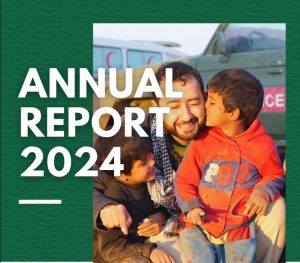Written By Mouaz Moustafa
Author: Lana Aldos
Interviewer and photographer: Mohamad Kazmooz
There are over 100,000 detainees in Assad’s prisons in Syria. For most war detainees, their only crime is demanding their freedom from a dictatorship that masks behind a democracy. In the past few months, the Assad regime released detainees after an average of 5-9 years of imprisonment. The regime continues to release prisoners in exchange for money or other forms of bribery. Prisoners in Assad’s hell prisons accused the regime of using imprisonment as a fear tactic and a way to threaten families in exchange for their cooperation. Unfortunately, when a prisoner is detained, his/her whereabouts are unknown, and for many prisoners, when they die under torture in Assad’s hell prisons, their families are still unaware of their fate. For those who are released after years of abandonment, torture, and misery, their life post-detention consists of psychological, physical, and social issues that deprive them of living a normal life.
Umm Saleh, 65, was detained in Assad’s prisons for three years. She has 4 children and was detained in early 2017 for simply stating her opinion against the regime. She was a strong woman in her community. When the regime detained Umm Saleh, her children were left to fend for themselves, alone, in the suburbs of Idlib. During her detainment, she was subjected to all forms of psychological and physical torture.
Many families who lost a loved one to detention lose hope of ever seeing them again. Umm Saleh was released after three years in detention. When she was released, she described her life as another prison.
For Umm Saleh, as much as she was filled with joy to see her family again, she had missed their upbringing. She finally joined her family in a deteriorated financial situation that left her and her children struggling to survive.
The economic downslide in Syria is not the only thing that affected Syrians in the past 10 years. For released detainees like Umm Saleh, their release from Assad’s prisons with all kinds of health issues, left them living a life that is nothing short of unlivable.
Prior to her imprisonment, Umm Saleh was strong, healthy, and joyful, and after her imprisonment, she is struggling with mental health issues such as anxiety and depression and physical health issues including hypertension, arthritis, diabetes, and rheumatism. When she was asked about the reasons behind her health issues, Umm Saleh said, “fear and the sound of detainees being tortured are painful and haunting.”
For many like Umm Saleh, they don’t have the financial ability to recover their health treatments after detention or prioritize their health when war is still ongoing and basic needs such as food, water, and housing are still unmet.
There are an average of 30 prisoners in a 8m x 6m cell in Assad’s prisons, and that alone brings all forms of health issues. In a small, dark, and crowded cell, prisoners often take turns sitting down and relieving the pressure off their legs after standing up for days. While unable to sit, prisoners are also deprived of sleep, food, clean water, and medicine. Without basic necessitates alone, prisoners begin developing health issues and if not treated, and when never treated in Assad’s prisons, their life is cut short. This is the life of a prisoner in Assad’s prisons, but many detainees still describe this as mercy because alive is better than dead. The Assad regime is unmerciful and uses all forms of torture to further strip detainees of their humanity and slowly bring them closer to death. For this reason, Assad’s prisons are hell prisons.
The international community failed to recognize and protect released detainees, considering them like any other war victim. While they are still victims, released detainees experienced the worst forms of evil, and their right to health to attempt to live a normal life should be recognized. For released detainees like Umm Saleh, their wish is to obtain medicine to live and seduce the pain they experienced while in prison, the same pain that haunts them daily.
Released detainees battle mental issues that limit their integration into society and their life with their families. Without proper mental health or other forms of health services, released detainees like Umm Saleh will struggle to live. The Assad regime is aware of the struggles of released detainees as some of those released have lost their memory and cannot remember a life or a family to return to. The international humanitarian community must recognize the health issues and access barriers for released detainees and must acknowledge that in addition to all the other violations against the Assad regime, violating a detainee’s right to health during and after detention is also a human rights violation.









